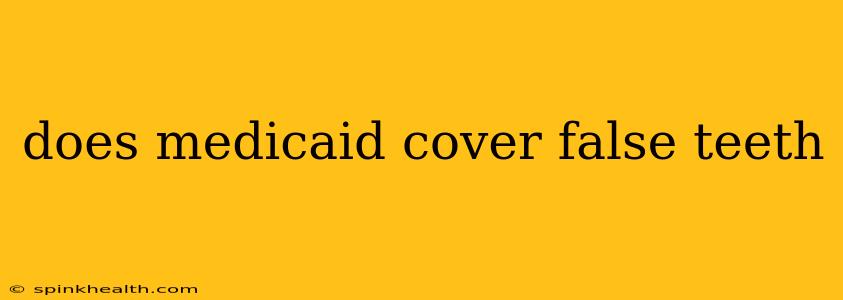Does Medicaid Cover False Teeth? Navigating the World of Dental Coverage
The question, "Does Medicaid cover false teeth?" is a common one, and the answer, unfortunately, isn't a simple yes or no. It's a journey into the often-complex world of Medicaid coverage, a journey I'm happy to guide you through. Imagine this: You've lost teeth, perhaps due to an accident, disease, or simply the wear and tear of time. You need dentures, but the cost seems insurmountable. Medicaid might offer a lifeline, but understanding exactly what it covers requires careful navigation.
Let's begin our exploration by understanding the fundamental principles governing Medicaid dental coverage.
What Does Medicaid Typically Cover?
Medicaid, a joint state and federal program, provides healthcare coverage to low-income individuals and families. While the specifics vary by state, Medicaid generally aims to cover medically necessary dental services for children and pregnant women. This often includes routine checkups, cleanings, and extractions, but it rarely covers the cost of dentures, which are considered restorative rather than preventative care.
So, Does Medicaid Cover Dentures? The Complicated Reality
This is where things get tricky. While the majority of Medicaid programs do not cover dentures as a routine benefit, there are some exceptions and nuances:
-
State Variations: The key phrase here is "state variations." Each state administers its Medicaid program independently, resulting in significant differences in coverage. Some states might offer limited coverage for dentures in specific circumstances, perhaps under exceptional medical necessity. This necessitates checking with your specific state's Medicaid office for their precise guidelines.
-
Emergency Situations: If the loss of teeth poses a serious medical risk, some states might cover dentures under emergency circumstances. This could involve severe infections or other conditions directly related to the missing teeth. Again, this is highly dependent on the individual circumstances and the specific state's policies.
-
Children and Pregnant Women: The most likely scenario for Medicaid to cover some aspect of denture-related care is for children and pregnant women, particularly when necessary for their overall health and well-being. However, this usually pertains to more basic extractions and sometimes temporary dentures.
What about Partial Dentures?
The coverage for partial dentures generally follows the same principles as full dentures. It's highly unlikely to be covered routinely, but exceptions may exist under specific, medically necessary circumstances as determined by the state's Medicaid guidelines.
How Can I Find Out If My State Covers Dentures?
The best approach is always to contact your state's Medicaid agency directly. Their website should have comprehensive information on dental benefits, or you can call their customer service line. Don't rely on assumptions – a direct inquiry is essential for accurate information.
What Are My Options If Medicaid Doesn't Cover Dentures?
If Medicaid doesn't cover dentures, there are alternative options you can explore:
-
Dental Insurance: Consider purchasing a supplemental dental insurance plan. While this will involve a monthly premium, it might provide better coverage for dentures.
-
Dental Payment Plans: Many dental practices offer payment plans to make treatment more affordable.
-
Dental Schools: Dental schools often offer affordable dental care provided by students under the supervision of experienced dentists.
-
Local Charities and Community Programs: Inquire about local charities and community organizations that provide dental assistance to those in need.
The journey to obtaining dentures can be challenging, particularly when navigating the complexities of Medicaid. Remember, thorough research and direct communication with your state's Medicaid agency are key to understanding your specific coverage options. Don't hesitate to ask questions; your oral health is important, and understanding your options is the first step toward finding a solution.

